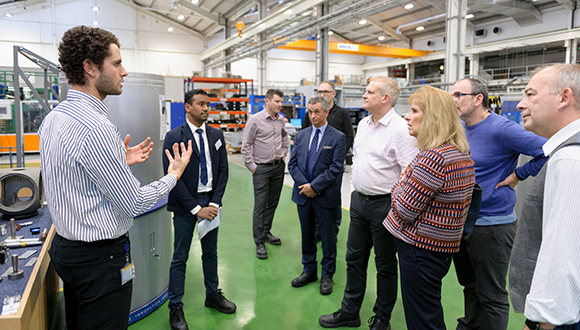Tue, 07 July, 2020
Pedro Santos - NSIRC PhD Researcher with Coventry University, TWI Senior Project Leader
PhD Title: Development of the refill friction stir spot welding (RFSSW) process for lightweight aerospace applications
...
Today, Pedro Santos is a successful TWI Senior Project Leader, based in the Friction and Forge Processes section, whose initial path into TWI, a research and technology organisation, involved being a PhD candidate with the NSIRC (National Structural Integrity Research Centre).
After completing an industrial placement at TWI Cambridge, working on an Innovate Project which used friction stir welding, Pedro’s section manager was impressed with his performance and encouraged him to sign up as an NSIRC PhD studentship. Having begun his studies in Portugal, Pedro says that opportunities for a fully funded and paid PhD are very rare. The NSIRC PhD funding was an exceptional chance to engage in postgraduate academic study, alongside professional engineering experience.
```
```
Studying for a PhD degree
His PhD research proposal focused on the latest friction stir welding (FSW) process, refill friction stir spot welding, an area which had not seen any real industrial applications. Pedro was able to identify a gap in the study of the relationship between the tooling components and performance of the joints, and found he could build on it. As a result of his PhD work, he is now one of the most knowledgeable experts on this subject having recently completed his research.
Industrial PhD life
There was also great opportunity on his PhD programme to meet professional and technical experts, and to experience a variety of engineering processes and technologies. Pedro has described the NSIRC degree as a three-year job interview. During which this, the employer can see a candidate’s progression from their first year to the end of their full time PhD, and their development and the expansion of their skills is clearly visible.
His experiences throughout the course – some of which didn’t go as planned, but others that were successes where he could show skill and competence – allowed him to further his professional development. NSIRC doctoral students have access to opportunities like workshops, conferences, and other TWI events. Together, they enriched Pedro's experience, background knowledge and work life balance, giving him valuable skills and industry training. He has credited NSIRC and TWI with making him both a better engineer and professional.
 Pedro presented the Refill Friction Stir Spot Welding (RFSSW) facility at TWI, to senior academic from Coventry University. Photo: TWI Ltd
Pedro presented the Refill Friction Stir Spot Welding (RFSSW) facility at TWI, to senior academic from Coventry University. Photo: TWI Ltd
Joining TWI as an early career researcher (ECR)
After completing his postgraduate degree, Pedro chose to stay with TWI, accepting his current post as a Senior Project Leader, rather than move to a different company. His studies gave him experience working with many of the technicians and experts at TWI, as well as project management and systems skills. He also notes that the professional relationships he had cultivated during working days, and the attractive location of Cambridge, encouraged him to stay at the company that helped him develop as a doctor of philosophy.
Pedro’s research on refill friction stir spot welding is not yet published, but it does link his former academic study to his current position. He hopes that it will augment understanding of the relationship between tooling components and performance of joints, and facilitate industrialisation of the friction stir welding process.
He is optimistic that his research question was not simply useful experience, but is relevant to industry, and will affect his current job as well as the work TWI is engaged with in future engineering advances in specialist areas, such as FSW.
NSIRC and TWI Innovation Network (TWIIN)
NSIRC is a pillar of the TWIIN which works across a range of industry sectors to provide technology and engineering research advances through collaboration and coordinated partnerships.
...
Other links that readers also visited: